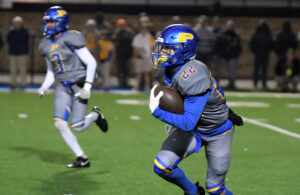Leave coaching to coaches
- Updated: May 12, 2018
Guest commentary: ‘Coaching’ from the bleachers does more harm than good
By Stephen Gay
Special to East Alabama Sports Today
WEAVER – Most parents want to be involved in the success of their child when it comes to sports. The issue that has arisen is distractions from parents during games and practice.
The majority of parents have good intentions and want their child and the team to play well, but players are often distracted by patrons yelling instructions from behind the backstop during baseball and softball games. It may be great advice, but the player’s mind is no longer on the most important thing, which is focusing on the ball or the team strategy.
Successful coaches give a sign to a batter or call a play, wait for results, and move on to the next strategic part of the game. They have learned from past experience that technique and instruction are best corrected during practice. Coaches often try to teach or correct too much at one time during a game – it’s called “overcoaching” and results in confusion and distraction.
Parents and guardians are the most important factor in a child’s success in athletics because they monitor diet, personal training, sleep, daily exercise, and most of all, discipline outside of school. However, this control should not supersede a coach during practice or games.
Parents and fans often overlook the credentials of certified high school coaches. They attend training throughout the year on CPR, concussions, first aid, rules, regulations and advances in technique for each individual sport. Certified high school coaches also have a degree in teaching that is a mastery put to use in the classroom and on a field or court. Teachers are trained to relate ideas and concepts to help athletes learn skills. Players should give coaches their allotted time and undivided attention during games and practice and the probability of success will improve.
We all have heard the term “armchair quarterback.” Parents and fans should be mindful of the decision-making process of a head coach because they are constantly scrutinized. Successful coaching is no more than an educated guess on predicting the ability and decision making of athletes.
Every head coach at one time has been an assistant coach of a sport. Assistant coaches and fans have the ability to critique a decision after the outcome with no repercussion. Fans should always be mindful that decisions are harder to make when the outcome is amplified as well as knowing where 100 percent of the blame is going, and good coaches never blame the athletes.
Parents and fans also should be mindful how to handle mistakes during games. Baseball and softball coaches teach athletes the term “short memory,” which means they should put mistakes behind them and focus on the next task at hand. When an athlete makes a mistake, expressing loud and open negativity afterward reduces confidence and increases the probability of future mistakes. Negative remarks can turn good ballplayers into unconfident mediocre ballplayers.
Take the idea of Field percentages. They are measured at every level of athletics, which means mistakes are anticipated. The objective in coaching is to reduce the probability of mistakes by practice, experience and technique. Mistakes should be looked at as opportunities for correction and success.
Coaches are recommended to have open lines of communication with parents. They can express concerns about discipline and other aspects of the game that may need improving. Parents working alongside coaches and not against them has proven to allow opportunities for success not only with players but with programs.
Stephen Gay is a teacher and assistant baseball coach at Weaver High School. Cover photo by B.J. Franklin










You must be logged in to post a comment Login